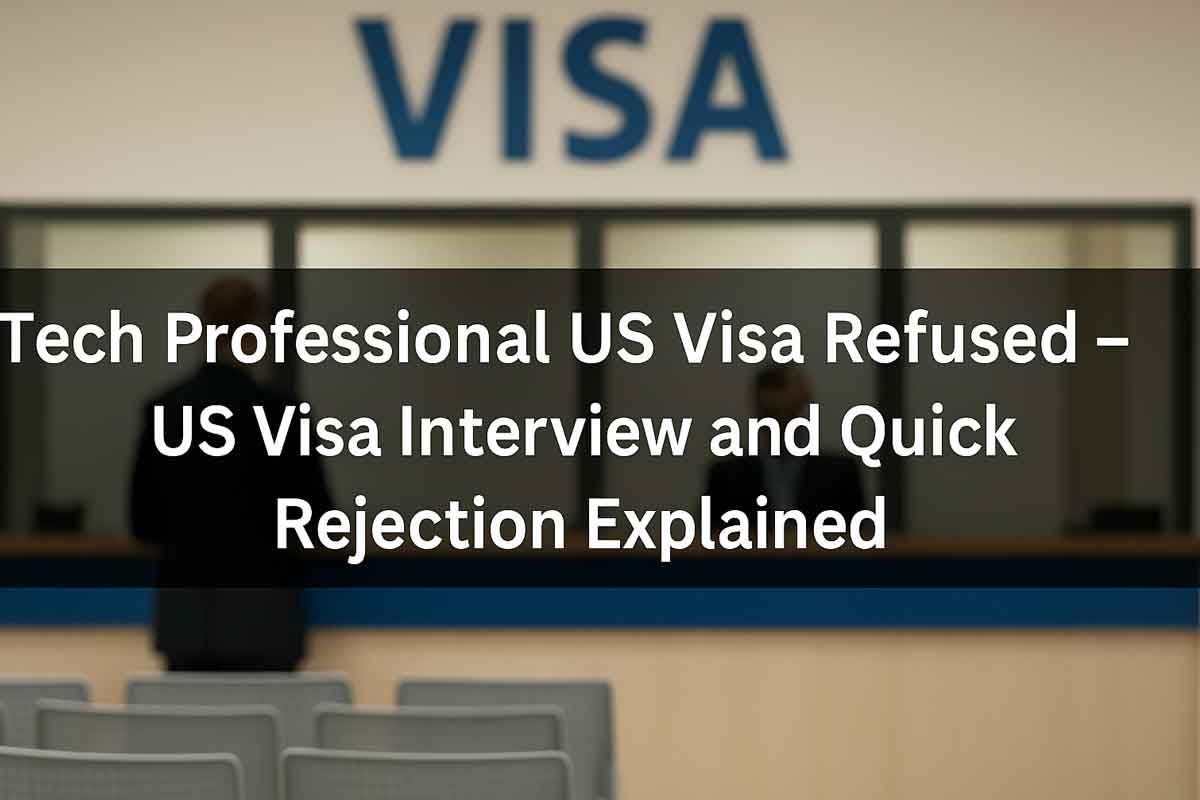A recent case of a US visa refusal has drawn attention. In early November 2025, a senior Indian technology professional applied for a B1/B2 visa at the US Embassy in New Delhi with plans to attend a major tech conference in the United States. Despite strong credentials, confirmed travel plans, and what appeared to be clear ties to India, his application was denied in under a minute after only a few questions from the consular officer. This article explores what happened, why the refusal matters, and what can be learned.
US Visa Interview and Quick Rejection
The applicant had been working in India for over 11 years, earning close to ₹1 crore annually, and had an eight-month-old daughter — factors usually considered in favour of demonstrating strong home-country ties. Yet, during his US visa interview he was asked only three questions: the purpose of travel, previous international trips, and whether he had relatives or friends in the United States. He responded clearly, confirming a booked conference in Atlanta and prior travel records. Nonetheless, his US visa was refused under Section 214(b) of the US Immigration and Nationality Act.
The interview lasted less than a minute and ended abruptly with a refusal slip. Despite the ticket reservations and hotel bookings already in place, the quick decision surprised many in the tech and travel community.

Techie Already Booked Tickets and Accommodation
The individual in question had completed travel arrangements and accommodation bookings for the conference, which was not available for live streaming. His plan was to attend in person and return to India afterwards. These bookings were intended to reinforce his intent to return home, yet they did not prevent the refusal.
Strong Ties to India Couldn’t Prevent Refusal
Ties such as long-term employment, high salary, dependent family members and residence in India are often important in visa assessments. In this case, the applicant’s stable career and family life did not change the outcome. The refusal suggests that the consular officer may have questioned some aspect of the interview or perceived risk of the applicant not returning. The law emphasises that a non-immigrant visa is a privilege, not a right, and ties alone do not guarantee approval.
Key Details
- Interview category: B1/B2 non-immigrant visa.
- Refusal occurred in under one minute and after three questions.
- Applicant’s profile: 11 years of employment in India, salary close to ₹1 crore per year, and an infant daughter.
- Planned purpose: Attend a tech conference in Atlanta, United States; travel and hotel bookings already made.
- Ground for refusal: Section 214(b) — failure to establish sufficient home-country ties or convincing return intent.
This incident highlights how subjective and unpredictable the US visa interview process can be, even for well-qualified applicants. Reviewers suggest preparing concise, direct answers and being ready for rapid decision-making in the interview room.
Disclaimer
The details presented here are based on publicly available news reports and testimonials from the applicant as of November 2025. They do not represent official statements from the US Embassy or the applicant’s employer. Visa outcomes are case-specific and may vary. Readers seeking visa guidance should consult immigration experts or the official US Department of State resources.
FAQs
Q. What does it mean when a US visa is refused under Section 214(b)?
A. A refusal under Section 214(b) means the applicant did not sufficiently convince the consular officer of strong ties to their home country or clear intent to return. It is the most common reason for US visa refusals.
Q. Can booking tickets and accommodation guarantee a US visa approval?
A. No. While confirmed travel plans and bookings may support an application, they do not guarantee approval. The decision depends on multiple factors including interview responses, perceived intent, and overall credibility.
Q. What should tech professionals do if their US visa is refused quickly?
A. Applicants should carefully review their interview responses, ensure accurate and consistent documentation, possibly strengthen their travel and employment ties, and consider reapplying after sufficient wait time or changes in profile.